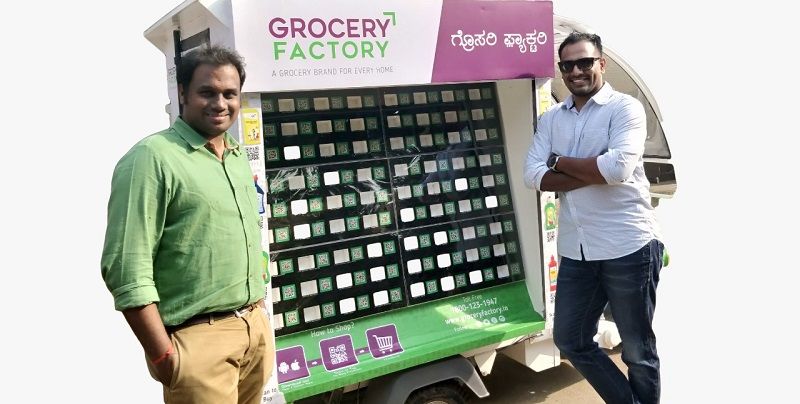The coronavirus pandemic is changing the way we shop, with grocery shoppers suddenly realising the convenience of shopping online and getting supplies in the comfort of their home.
This is set to benefit the direct-to-consumer (D2C) services in the long term. Selling directly to consumers also gives brands better control over their supply chain and cuts down on middleman costs.
Realising this trend much ahead of time, Arjun Shetty and Karthik Shetty founded Grocery Factory in 2015. The Bengaluru-based startup delivers staples and homecare products directly from manufacturers to consumers, and has also come up with its own brand of grocery products. From rice and pulses to dry fruits and spices, Grocery Factory has it all.

Grocery Factory founders Arjun and Kathik
“GF is building India’s first D2C in groceries. We have created the most-efficient supply chain and last-mile delivery for the consumers. Customers pay almost 20-30 percent lessercompared to any brand or competitors, and we still make money. We bring in our experience to give consistency every single time. We also built the direct selling model where customers can sell our products to their friends and family under the GF Partner,” says Karthik.
The startup is currently working with 400 farmers, and has been delivering to more than 25,000 customers in Bengaluru.
The beginnings
Arjun and Karthik are seasoned entrepreneurs, and have been in the grocery space for over 30 years. Earlier, they built a chain of supermarkets across Bengaluru under the brand Daily Mart. Before this, they worked in the wholesale trading of rice and pulses in Bengaluru, and hence understand the depth of the supply chain, sourcing directly from farms to the agri yards, and have built strong a relationship across the county from various millers over a decade now.
While they tried to take Daily Mart online in 2010, they realised how the market was not yet ready then, and hence they called off the plans and built an offline store. They decided to venture into the online space to become a part of the hyper-local boom and sold Daily Mart for an undisclosed amount to start Grocery Factory in 2015.
“We reached out to many investors, but were turned down during 2015-16. We also faced significant roadblocks as many startups shut shop in this space and we were offered to get acquired from one of the startups, which has now shutdown. To be in the grocery business, one needs to be deep-pocketed, and we were slow and steady until we built our own supply chain, the product line,the last-mile delivery, and most importantly, paying customers. That was how we primarily spent our first year,” says Arjun.
The business
According to KPMG and E&Y, the size of Indian grocery market is pegged at $500 billion, and the retail industry in India is worth $1 trillion.
While the online grocery business can comfortably accommodate a few players, building a sustainable model is the key for long-term growth.
“If you think going fast is the way to go in grocery, you will crash. Several players are solving different problems for different target segments. You need to understand your strength very well and position accordingly. Many have changed their business model over the years as they can’t fail due to the amount that has been invested,” says Karthik.
However, the founders did not find it easy when they launched a digital kiosk in Namma Metro Station in Bengaluru in 2016. But they soon realised they need to focus more on the product than the technology, and since then, they have only focused on improving the product.
Grocery Factory currently competes with the likes of Bigbasket and Ninjacart.
The founders have invested over Rs 4 crore of their personal money in the startup. They have also raised an undisclosed seed round from angel investors, and are closing pre-series A round soon.
The startup, which works by sourcing the product and distributing it to customers, controls the supply chain and makes money by selling the product online. It reported revenue of Rs 40 crore in FY 19-20, and expects to double its revenue in FY 20-21.
Plans ahead
The startup said it will continue to build in metros and Tier-II cities as it believes there is a high demand for such products across the country, and they will continue to add new customers.
During the coronavirus crisis, Grocery Factory on-boarded non-kirana stores to acquire more customers.
“We aim to onboard one lakh non-kirana stores as GF partners. By on boarding retail stores other than kirana stores, the company can reach as many customers as possible with a steady availability of product across stores,” says Karthik.
The startup wants to serve around 10 lakh households in the next 12-18 months in at least three states. It is currently operating in Bengaluru, and plans to expand its presence to Hyderabad and Chennai soon.
(Edited by Megha Reddy)
Want to make your startup journey smooth? YS Education brings a comprehensive Funding and Startup Course. Learn from India's top investors and entrepreneurs. Click here to know more.
Link : https://yourstory.com/2020/06/startup-grocery-factory-ecommerce-coronavirus
Author :- Vishal Krishna ( )
June 09, 2020 at 05:25AM
YourStory


